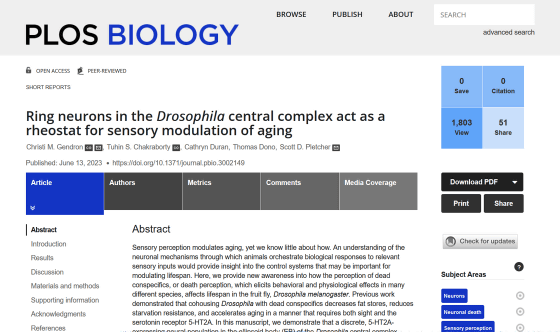Why does the ``fly that saw the corpse of a fellow'' accelerate aging and die prematurely?

There should be many people who have experienced the feeling that a close person died or touched the obituary of a celebrity and became depressed and got sick. A similar phenomenon seems to be seen in animals other than humans, and research results on `` flies that accelerate aging and die prematurely when they see the corpses of their fellows '' are published in the peer-reviewed academic journal PLOS Biology it was done.
Ring neurons in the Drosophila central complex act as a rheostat for sensory modulation of aging | PLOS Biology

How seeing corpses reduces the lifespan of fl | EurekAlert!
https://www.eurekalert.org/news-releases/991510
Seeing Dead Flies Makes Other Flies Die Faster, But Why? : ScienceAlert
https://www.sciencealert.com/seeing-dead-flies-makes-other-flies-die-faster-but-why
A research team led by Christie Jandron and Tuhin Chakraborty, molecular biologists at the University of Michigan, said in a 2019 study , `` Drosophila melanogaster, a type of fly, perceives the corpses of its fellows. Changes such as changes in behavior and a decrease in body fat percentage occur, which accelerates aging and causes them to die earlier than flies that have not seen the dead bodies of their fellow flies.'
The phenomenon of perceiving and reacting to the death of fellows has also been confirmed in other animals, and some insects have the habit of carrying the corpses of their fellows out of the nest ( necrophoresis ), as well as elephants, crows, and non-humans. primates have also been found to change their behavior in response to the death of a mate. However, it was unclear how Drosophila melanogaster's perception of ``a dead companion'' had a physical effect on the body.

by
Therefore, the research team of Mr. Jandron and Mr. Chakraborty focused on 5-HT2A , which is a receptor for serotonin (5-HT), a neurotransmitter in the brain, and found out which 5-HT2A neurons 'perceive death.' We conducted a study to investigate whether it is involved in the physical effects caused by '.
After injecting a fluorescent protein into the fly's brain so that the activated site can be identified and then exposing it to the same kind of corpse, when the corpse is perceived, an area called the `` ellipsoid '' in the center of the fly's brain turned out to be activated.

Further detailed analysis of the neurons that make up the ellipsoid revealed that two types of neurons, 'R2' and 'R4', are involved in the aging phenomenon associated with the perception of corpses. When these neurons were artificially activated, the lifespan of the flies was shortened, even if they were not actually seeing the corpses of their fellow flies.
This experiment was only for flies, and since the brains of humans and flies are very different, it is not possible to apply the research results to humans as they are. However, the research team said, ``Understanding the neural circuits in which the perception of death affects these expression systems will help future studies to understand allo-sensory experiences and other sensory experiences in individuals, including humans. I think so,” he said.
Understanding the biological processes in which perceiving the death of one's comrades causes changes in the body will help us to improve our understanding of the physical processes involved in life-threatening situations, such as soldiers and paramedics on the dangerous battlefields, who are routinely exposed to stressful environments surrounding death. There is a possibility that knowledge can be obtained to support people who are

Related Posts:







